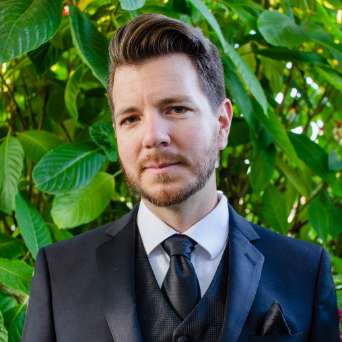I first encountered Jake Heggie’s music several years ago in the form of his powerful opera, Dead Man Walking which still remains a musical revelation. Heggie transformed Sister Helen Prejean’s story into an enveloping and taut musical drama. Heggie’s talents for melody and timing were striking then and, combined with Terrance McNally, it appeared that this creative team may be the future of contemporary opera. Astoundingly, it wasn’t until a week ago (some 15 years after the world premiere of Dead Man Walking in San Francisco) that Heggie was heard from at Los Angeles Opera. It was worth the wait.
In this 2010 opera, Heggie and librettist Gene Scheer take Melville’s Moby-Dick and compress the tome into a halfway manageable form for the stage. Yet Heggie’s Moby-Dick, like the whale itself, is still larger than life. With sets by Robert Brill and staging by Leonard Foglia, the blending of abstract and technical visuals makes this original production a continuously entertaining sight. The use of digital projection is clever yet tastefully moderate, and combined with the abstract features of the set, the Pequod sprang to life on the stage of the Dorothy Chandler Pavillion.
Yet more imperative to the piece’s success are Heggie’s skills as an opera composer. It is indeed rare to hear a contemporary composer with his profound understanding of the operatic idiom. Heggie’s opera weaves effortlessly from scene to scene, contrasting duets with full ensemble scenes, exposition with tableaux, in colorful sounds that recall Vaughan Williams and Richard Strauss. Furthermore, Heggie’s gift for melody hasn’t appeared to grow inert with the composer's sea shanty-esque tunes for the crew and a most glorious chorus, “Lost in the heart of the sea”.
As outstanding as these moments were, however, Moby-Dick occasionally seemed to sputter. At slightly over three hours (including intermission), it is not exceptionally long by opera standards, but it could seem long, particularly when developing the friendship of Greenhorn and Queequeg, the secondary story. That’s not to say this was entirely dispensable, as Heggie composed some of the most beautiful music of the evening for the young Greenhorn, sung by the outstanding tenor Joshua Guerrero. Yet the potency, not to mention the dramatic pedigree of the singers who sang them, of the Ahab/Starbuck struggle was the defining symbiosis of the opera and in the spirit of operatic simplification of the storyline, it seems that this could’ve been given more weight. The piece, in all its richness, seemed to distract from itself.
The obsessed captain was sung by tenor Jay Hunter Morris. Morris inhabited the role quickly, a demanding, relentless tenor role that seemed to just sit right on top of the passaggio. Morris appeared deranged, menacing as Ahab and his prolonged declamations against the full orchestra and chorus rang out in Morris’ full-throated, bright tenor. It was a frightening and riveting portrayal. Ahab’s foil, and conscience, Mr Starbuck, was sung by Morgan Smith, who created the role. A naturally grainy sound, Mr Smith’s baritone was ideally suited for the first mate. It is a role that Heggie imbues with sympathy and complexity. Starbuck’s pious struggle is a remarkable creation of music and character thanks to Heggie and Smith, and pitted against Morris’ Ahab, this was must-see theater.
The rest of the cast were impressively adept in this music as well, with Musa Ngqungwana singing Queequeg with a strong bass voice. Matthew O’Neill sang a nagging Mr Flask, and LA Opera favorite Malcolm MacKenzie was an endearing Mr Stubb. Soprano Jacqueline Echols sang the cabin boy, Pip, with a pristine soprano, a clever musical addition to the all-male cast. Nicholas Brownlee was a moving Captain Gardiner.
The chorus was excellent, not only singing Heggie’s massive scenes with authority and rhythmic vitality, but also in creating a cogent world on board the Pequod. James Conlon led the LA Opera Orchestra with impressive command, reveling in the grandiose, but also coaxing some beautifully attentive playing from his band.
There really is nothing quite like contemporary opera: a journey of discovery for artists and audience alike. There’s no doubt that the first time seeing Dead Man Walking was one of the key formulating experiences in my opera-going life. Likewise with Moby-Dick, a journey of discovery set in the heart of the sea, Heggie's brilliance shown through. And while I have some misgivings about the piece, Jake Heggie's operatic naturalness is not among them.




